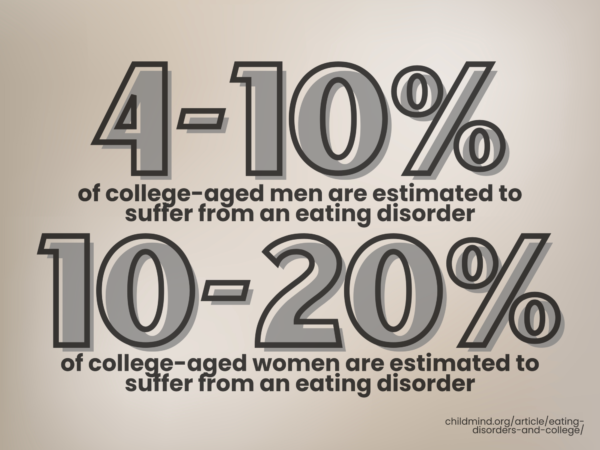If you or someone you know is struggling with an eating disorder, you are not alone and there is help available. The National Eating Disorders Association supports individuals and families affected by eating disorders.

One of the most triggering environments in the eating disorder world may be college campuses.
According to the National Eating Disorders Association, data from a study conducted on one college in the U.S. showed that 32% of female college students have eating disorders compared to 25% of males.
An array of experiences can lead to developing eating disorders. Some risk factors include low self-esteem, general stress or anxiety and body dissatisfaction.
The risk factors of eating disorders are heightened on campuses such as Tulane University. Experts have agreed that college students live in a bubble that makes life without an ED challenging. Dr. Allison Baker, a Massachusetts psychiatrist, has told the Child Mind Institute that the challenges of college life create a “perfect storm” for eating disorders.
So, what can students do to best equip themselves in an environment where eating disorders are so prevalent?
Students need a safe outlet to discuss the potential struggles they may run into as well as other thoughts and emotions. Regularly talking with a close friend, trusted family member or licensed professional can be the fork in the road between staying healthy and future years of struggling.
Limor Weinstein, MA, LMHC, FAED, a psychotherapist and eating disorder specialist, advises college students in ED-ridden environments to “acknowledge that they are experiencing a challenge, and if it is affecting their life, they should share that with someone they trust … Allowing themselves to be vulnerable and to share their thoughts and feelings with others without too much consideration to what other people think.”
Another way to help combat ED culture is by focusing on building self-esteem. High self-esteem is linked to a variety of benefits, ranging from positive social relationships to overall well-being. It is overwhelmingly obvious that students with high self-esteem are more equipped for challenges in college — and in life — than students with low self-esteem. It is never too late to build self-esteem, and it is a plausible goal for all college students.
Research suggests that students with low self-esteem are more likely to develop eating disorders and vice versa. Students experience a positive feedback loop between lowering self-esteem and developing an eating disorder — as one worsens, so does the other.
That is not a great place to be in during transformative college years.
Lastly, having routines provides necessary stability for students. Routines that are healthy and not restrictive can be a major tool in preparing students for the challenges to come. Routines as simple as skin care or making time for exercise during the week can make a world of a difference. A major marker of the undergraduate experience is the instability and constant change that occurs throughout college. Developing routines that serve as consistent and reliable parts of a student’s life can help to ground students and deter stress or anxiety.
Cheryl Beutell, a psychiatric nurse practitioner at Northwestern Medicine, tweeted, “A routine is how you build habits.” Truthfully, routines are very important in caring for mental health. Students who develop healthy routines turn into students with healthy habits, which inevitably impacts a student’s likelihood of running into mental health challenges.
The development of an eating disorder is complex, and so is the recovery from one. College campuses certainly hold a concentrated number of students who have been touched in some way or another by an eating disorder, but that doesn’t mean that it has to stay that way.


